Update
Environment @ 55th Session of the UN Human Rights Council
The 55th Regular Session of the Human Rights Council (HRC55) took place in Geneva from 26 February to 5 April 2024. This page highlights the environmental-related activities of this session.
The 55th regular session of the Human Rights Council took place in Geneva from 26 February to 5 April 2024. The Council proceedings can be viewed on UN TV. The meeting summaries are available on the UN Geneva website and the live-updated programme of work on Sched.
Opening of HRC55
The 55th session of the Human Rights Council opened in Geneva on 26 February 2024, where the environment featured in the statements by dignitaries present, including the President of the UN General Assembly, H.E. Amb. Dennis Francis, and the UN Secretary-General, António Guterres.
- H.E. Amb. Omar Zniber of Morocco, President of the Human Rights Council, underscored the indivisibility and interdependence of human rights that are inherent to all, showing that the environmental crisis is also at the heart of our concerns. He underscored the crucial role that multilateralism will play in addressing the crises the world faces today.
- H.E. Amb. Dennis Francis emphasized the urgent need to protect victims of human rights violations around the world. He highlighted the upcoming 4th International Conference on Small Island Developing States and the General Assembly’s high-level meeting on the existential threats posed by sea-level rise, making strong links between climate change and human rights. The 10th anniversary of the World Conference on Indigenous Peoples on 17 April was also mentioned.
” A war on nature is a war against human rights.”
— UN Secretary-General António Guterres
- Environmental justice and human rights featured strongly in the speech delivered by the UN Secretary-General, António Guterres. In the face of the triple planetary crisis, he underscored the responsibilities of States to protect both people and nature, calling for the ethical and equitable treatment of all human rights.
- UN High Commissioner for Human Rights Volker Türk launches “Human Rights: A Path for Solutions” which distills the work and contributions made during the 75th anniversary of the UN Declaration of Human Rights. The work will be part of the contributions towards the Summit of the Future.
Highlights
Right to a Clean, Healthy and Sustainable Environment
The United Nations General Assembly‘s historic decision in July 2022 to recognize that everyone has the right to a clean, healthy and sustainable environment has placed this landmark recognition at the forefront of the human rights agenda, following the same recognition by the Human Rights Council in October 2021. Not only is this a catalyst for accelerated action to tackle the triple planetary crisis, but it also places our attention on people and communities in vulnerable situations.
The right to a clean, healthy and sustainable environment is the usual main environmental theme of the Council’s March sessions, with the Special Rapporteur’s annual Report to the Council.
Report | Business enterprises, planetary boundaries and the human right to a clean, healthy and sustainable environment
Scientific evidence that humanity is exceeding planetary boundaries calls for an urgent rethinking of the business and economic paradigms that have pushed civilization to the brink of disaster.
Presenting his annual report to the Human Rights Council (A/HRC/55/43) on the magnitude of ongoing business contributions to the planetary crisis, the UN Special Rapporteur on the issue of human rights obligations relating to the enjoyment of a safe, clean, healthy and sustainable environment evaluates the inadequacies of voluntary normative frameworks for ensuring that businesses respect human rights and clarifies State obligations to protect the right to a clean, healthy and sustainable environment from harms caused by businesses.
Systemic and transformative changes are needed to achieve a just and sustainable future, including new business models, climate and environmental laws that incorporate planetary limits, fiscal policies that internalize externalities and reduce inequality, and holistic societal goals that replace gross domestic product (GDP) and limitless growth.
Report | Summary report on One-day seminar on “The responsibility of business enterprises to respect the human right to a clean, healthy and sustainable environment”
Pursuant to Human Rights Council resolution 52/23, the UN Special Rapporteur on human rights and environment organized a one-day expert seminar on the responsibility of business enterprises to respect the human right to a clean, healthy, and sustainable environment. The seminar brought together academic experts, civil society organizations, business and finance representatives, experts of UN agencies, funds and programmes, treaty bodies, special procedures mandate holders, other international organizations and conventions, with support received from the UN Environment Programme.
A report on the seminar (A/HRC/55/41) was submitted to the Council at its 55th session in March 2024, and summarized key points related to systemic problems facing the global economy, promising practices with regard to the responsibility of business enterprises to respect the human right to a clean, healthy and sustainable environment, gaps in the current normative frameworks and the necessary next steps.
Reports on the Special Rapporteur Visits
The Special Rapporteur also presented his reports on his visits to Chile (A/HRC/55/43/Add.1) and Botswana (A/HRC/55/43/Add.2). An interactive dialogue on the reports of the country visit with the Special Rapporteur also took place on 6 March 2024.
Highlights | Interactive Dialogue
An interactive dialogue on the reports with the Special Rapporteur took place on 6 March 2024.
Environmental Human Rights Defenders
Environmental human rights defenders (EHRDs) are those who strive to protect, promote and safeguard a clean, healthy, and sustainable environment, as recognized in HRC Resolution 40/11. From the local to the international level, the efforts of EHRDs have provoked responses to the three interlinked environmental crises afflicting our planet – the loss of biodiversity, pollution, and climate change. However, evidence suggests that they remain highly vulnerable and under attack across the globe.
Report | “We are not just the future”: challenges faced by child and youth human rights defenders
Children and young persons are increasingly active in the field of human rights, promoting and protecting the rights of others. Children and youth who act as human rights defenders (HRDs) face many of the same challenges as adults who act as HRDs. But they can also meet extra problems because they are children and youth (under 32).
In this session of the Council, the Special Rapporteur on the situation of human rights defenders, Mary Lawlor, presented a report on the challenges faced by child and youth human rights defenders (A/HRC/55/50). Providing an analysis of the situation of child and youth human rights defenders, the report focuses on structural and societal barriers to their activism, legal restrictions on their participation in civic space, and the human rights violations that they face as a result of their peaceful activities in promoting and protecting human rights.
Interactive Dialogue
An interactive dialogue on the report with the Special Rapporteur took place on 12 March 2024.
Reports on the Special Rapporteur Visits
The Special Rapporteur also presented her reports on her visits to Tajikistan (A/HRC/55/50/Add.1) and Georgia (A/HRC/55/50/Add.3). An interactive dialogue on the reports of the country visit with the Special Rapporteur also took place on 12 March 2024.
Geneva Rights and Environment Talks

In the face of the three interrelated environmental crises — climate change, loss of biodiversity, and pollution — the recognition of the right to a clean, healthy, and sustainable environment by the UN Human Rights Council and the UN General Assembly is an important milestone that puts environmental issues at the forefront of the human rights agenda.
The Special Rapporteur on human rights and the environment reports to the Human Rights Council during its March session on issues related to his mandate. The Geneva Rights and Environment Talks aim to harness the opportunity of this moment of the year to reflect on the challenges posed by the rapid decline of nature and biodiversity and the intertwined human rights implications. The talks are also an opportunity to discuss how Geneva contributes to bringing together the actors working towards ensuring the right to a clean, healthy, and sustainable environment is upheld for all.
Right to Food and Environment
Hunger and food insecurity are global problems. According to the State of Food Security and Nutrition in the World 2023, 783 million people in the world faced hunger in 2022. This problem is likely to get worse given the expected increase in the world’s population and the stress on natural resources. Moreover, unsustainable food production and consumption practices have led to environmental degradation and exacerbated climate change. In return, food systems suffer from the triple planetary crisis of climate change, biodiversity loss and pollution, which can prevent the realization of human rights, including the right to food.
Report | Fisheries and the right to food in the context of climate change
The Special Rapporteur on the right to food, Michael Fakhri, presented his report to the Human Rights Council on fisheries and the right to food in the context of climate change (A/HRC/55/49).
Just as there is no life without water, there is no life for millions of people in coastal and riparian communities without small-scale fishers and fish workers. The full enjoyment of human rights by small-scale fishers and fish workers is therefore a necessary precondition for the realization of the right to food by everyone.
In the present report, the Special Rapporteur focuses on small-scale fishers, fish workers and Indigenous Peoples reliant on fishing, because they are on the front lines of climate change. The report is built upon and advances the work done by previous mandate holders and in the context of the International Year of Artisanal Fisheries and Aquaculture.
The pandemic, climate change, pollution and overfishing are brutally harming small-scale fishers, fish workers and their communities. Nevertheless, small-scale fishers, fish workers and Indigenous Peoples remain stewards of the world’s waters; they have demonstrated a capacity to adapt to climate change and play an important role in restoring, conserving, protecting and jointly managing local aquatic and coastal ecosystems. They are integral to most countries’ recovery from the pandemic and food system transformation, considering that small-scale fisheries employ more people than all other ocean economic sectors combined. Including subsistence and secondary sector workers and their dependents, it is estimated that about 600 million livelihoods depend at least partially on fisheries and aquaculture, 95 per cent of those workers are in the global South. Based on recent annual averages, small-scale fishing accounts for 90 per cent of the world’s capture-fishing employment. Of the 92 million tons of fish captured annually, 40 per cent are captured by small-scale fishers.
Highlights | Interactive Dialogue
An interactive dialogue on the report with the Special Rapporteur took place on 7 March 2024.
Cultural Rights and the Environment
“The universality of human rights, including cultural rights, has no meaning today without a liveable environment in which they can be enjoyed.”
— Report of the Special Rapporteur in the field of cultural rights on Universality, cultural diversity and cultural rights (A/73/227)
Cultural diversity is an essential factor for the realization of all universal human rights, and full respect for human rights both creates an enabling environment for, and is a guarantee of, cultural diversity. Environmental degradation, including the triple planetary crisis of climate change, biodiversity loss, and pollution, does not only prevent the realization of the right to a clean, healthy, and sustainable environment but also jeopardizes the “conditions allowing all people, without discrimination, to access, participate in and contribute to cultural life through a process of continuous development” (A/75/298).
Report | Right to participate in science
Today, particularly in the post-Covid and climate change context, many ongoing conversations focus on the important contribution of science to the realization of human rights and the sustainable development goals. The Special Rapporteur believes that this discussion must be placed in a human rights framework. It is important to reiterate the human rights dimension of science, and to understand access to and participation in science as crucial human rights issues.
In her report to the Human Rights Council, the Special Rapporteur in the field of cultural rights, Alexandra Xanthaki, addressed the right to participate in science (A/HRC/55/44). The report takes stock of setbacks and progress both under international human rights law and in practice regarding access to scientific knowledge and its applications. It focuses more on the rather unexplored issue of participation in scientific life, as part of cultural life. Central questions include what participation means, what are possible limits to it, and how to ensure it in ways that complement scientific expertise, in the context of societies that are challenged by misinformation and disinformation. It also reflected more broadly on the definition of science, scientific expertise and exclusionary processes such definitions may entail; on the notion of scientific diversity; on challenges and obstacles to participation; on conditions and best ways to ensure it; as well as on the intrinsic relationship between access and participation.
Highlights | Interactive Dialogue
An interactive dialogue on the report with the Special Rapporteur took place on 7 March 2024.
Climate Change and Human Rights
Climate change is an existential threat for people and the planet. Its harmful effects undermine the full enjoyment and realization of all human rights, disproportionately affecting those who are already in vulnerable situations. Over the past years, the Human Rights Council took on resolutions and discussions on specific aspects of climate change, while Special Rapporteurs contributed with reports on specific thematic angles within their mandates.
Report | Measures for minimizing the adverse impact of climate change on the full realization of the right to food
In this session of the Human Rights Council, the High Commissioner is presenting a report (A/HRC/55/37) that identifies measures for minimizing the adverse impact of climate change on the full realization of the right to food. The High Commissioner focuses on socioeconomic systems, presenting five pathways that illustrate how human rights-grounded measures can minimize the adverse impact of climate change on the full realization of the right to food and how a transformation of food systems can, at the same time, help mitigate climate change.
This is in line with the panel discussion convened at the 53rd session of the Council that focused on the adverse impact of climate change on the full realization of the right to food (A/HRC/RES/50/9) for all people and ways forward to address the challenges thereto (as well as on best practices and lessons learned, including science-based approaches and local and indigenous knowledge). → Consult our page for highlights of the panel discussion.
Highlights | Interactive Dialogue
An interactive dialogue on the report by the High Commissioner took place on 14 March 2024.
Report | Resettlement after evictions and displacement: addressing a human rights crisis
In this session of the Human Rights Council, the Special Rapporteur on adequate housing as a component of the right to an adequate standard of living, and on the right to non‑discrimination in this context presented his report on “Resettlement after evictions and displacement: addressing a human rights crisis” (A/HRC/55/53).
The report elaborates on the current state of crisis with respect to resettlement of persons following evictions and displacement, which negatively affects the right to adequate housing and other human rights. The report also aims to launch a clarion call to prevent and counteract the poor outcomes and negative impacts of resettlement in an age that is witnessing increased displacement caused by disasters, development, conflict, uncontrolled use of eminent domain, urbanization, industrial agriculture, climate change and other drivers.
The Special Rapporteur reviews existing standards in international human rights law on resettlement, its main drivers and the key reasons for the poor outcomes of resettlement and explores alternative pathways to improve the record of resettlement, and concludes with recommendations for avoiding and reducing the harm caused by displacement and poor resettlement outcomes.
Interactive Dialogue
An interactive dialogue with the Special Rapporteur took place on 5 March 2024.
Appointments at HRC55
The Human Rights Council also appointed environment-related expert mechanism and special procedure mandate holders at its 55th session. These include:
- Special Rapporteur on the human right to a clean, healthy and sustainable environment | Astrid PUENTES RIAÑO (Mexico)
- Special Rapporteur on the promotion and protection of human rights in the context of climate change | Elisa MORGERA (Italy)
Members of the Working Group on the rights of peasants and other people working in rural areas and of the Expert Mechanism on the rights of Indigenous Peoples were also appointed during this session.
Related Activities on the Sidelines of HRC55
FIFDH 2024
The International Film Festival and Forum on Human Rights (FIFDH) took place from 8 – 17 March 2024. This year’s selection included films that focus on the environment, climate change, rights of Indigenous Peoples, business and human rights, among others.
Impact Days
The FIFDH Impact Days bring together NGOs, filmmakers, impact practitioners, and funders to find joint strategies around common human rights themes, including on the environment. Taking place from 10-12 March 2024, the 6th edition of Impact Days featured documentary projects, with the goal of working with filmmakers to refine their impact goals, and facilitate partnerships within the vast ecosystem of organisations, policymakers and funders active around International Geneva. → Discover the program.
Events
Date and time of some events subject to change on the live-updated programme of work on Sched.


HRC55 Info-Sharing Session | Human Rights and the Environment
8 February 2024 | 10:00 – 11:00 CET | IEH1, Room 2 & Online, Webex
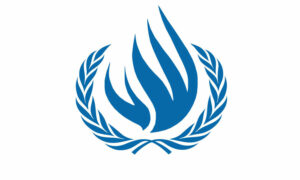
Organizational meeting for the 55th session of the Human Rights Council
12 February 2024 | 15:00 – 18:00 CET | Palais des Nations, Room XX & Online

Inscription on the lists of speakers | NGOs
20 February 2024 | 14:00 CET
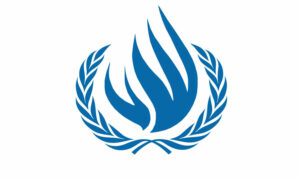
Opening of the session
26 February 2024 | 9:00 – 9:45 CET | Palais des Nations, Room XX & Online

In Defence of Civic Space and Democracy - Supporting the Work of Human Rights Defenders | HRC55 Side Event
26 February 2024 | 13:00 – 14:00 CET | Palais des Nations, Room XXII
Finland & ISHR
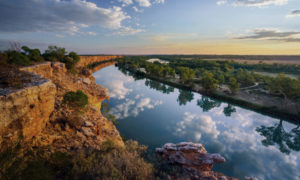
The People's Permanent Sovereignty over Natural Resources within the Context of Decolonisation: The Case of Western Sahara | HRC55 Side Event
27 February 2024 | 14:30 – 15:30 CET | Palais des Nations, Room XXII & Online
Zimbabwe on behalf of a group of countries

Climate Neutrality and Human Rights | HRC55 Side Event
29 February 2024 | 16:00 – 17:00 CET | Palais des Nations, Room XXV
United Towns Agency for North-South Cooperation

Informal consultations on the draft resolution on the mandate of the Special Rapporteur on the issue of human rights obligations relating to the enjoyment of a safe, clean, healthy and sustainable environment
4 March 2024 | 15:00 – 16:30 CET | Palais des Nations, Room XXII & Online
Costa Rica, Maldives, Morocco, Slovenia & Switzerland

Human Rights and Environmental Impacts of Investors-States Dispute Settlements (ISDS) Mechanisms | Geneva Rights and Environment Talks
5 March 2024 | 13:00 – 14:00 CET | Villa Rigot & Online
SR environment and human rights, Earthjustice, CIEL, IISD, Global Cities Hub & GEN

The Right to a Clean, Healthy and Sustainable Environment: Consensus Building on Its Scope and Links With Other Human Rights | HRC55 Side Event
5 March 2024 | 14:30 – 15:30 CET | Palais des Nations, Room XXVII
Geneva Academy, Switzerland, Costa Rica, Slovenia, Morocco & Maldives

Interactive Dialogue with SR on the right to adequate housing
5 March 2024 | 15:00 – 17:00 CET | Palais des Nations, Room XX & Online
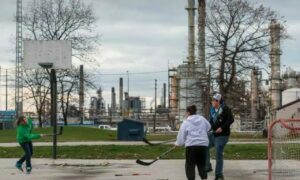
Business, Planetary Boundaries, and the Right to a Clean, Healthy and Sustainable Environment | HRC55 Side Event with SR on human rights and the environment
5 March 2024 | 16:00 – 17:00 CET | Palais des Nations, Room XXV
SR human rights and environment, UNEP, GEN

Interactive Dialogue with SR on human rights and the environment
6 March 2024 | 12:30 – 17:30 CET | Palais des Nations, Room XX & Online

FAO’s work on the themes of the United Nations Declaration on the Rights of Peasants and Other People Working in Rural Areas (UNDROP) | HRC55 Side Event
6 March 2024 | 15:00 – 16:00 CET | Palais des Nations, Room XXV
FAO, Bolivia & OHCHR

Advancing the Right to a Clean, Healthy, and Sustainable Environment | Breakfast Meeting
7 March 2024 | 8:15 – 9:45 CET | By invitation only

Interactive Dialogue with SR on cultural rights
7 March 2024 | 10:45 – 13:00 CET | Palais des Nations, Room XX & Online

Safeguarding Fisher Peoples’ Human Rights in the Face of Threats of Blue Economy | HRC55 Side Event
7 March 2024 | 12:00 – 13:00 CET | Palais des Nations, Room XXV
FIAN International

Interactive Dialogue with SR on the right to food
7 March 2024 | 12:30 – 17:00 CET (TBC) | Palais des Nations, Room XX & Online

Informal consultations on the draft resolution on the mandate of the Special Rapporteur on the issue of human rights obligations relating to the enjoyment of a safe, clean, healthy and sustainable environment
7 March 2024 | 15:00 – 16:30 CET | Palais des Nations, Room XXII & Online
Costa Rica, Maldives, Morocco, Slovenia & Switzerland
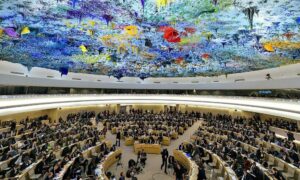
Informal consultations on the draft resolution on adequate housing as a component of the right to an adequate standard of living, and the right to non-discrimination in this context
8 March 2024 | 11:30 – 13:00 CET & 15:00 – 16:30 CET | Palais des Nations, Room XXVII & Online
Finland, Brazil, Germany & Namibia

Clarifying Norms in Conservation and Human Rights | HRC55 Side Event
8 March 2024 | 13:00 – 14:00 CET | Palais des Nations, Room XXV
UNEP & GEN

Nuclear Resilience for Peace and Prosperity | Photo Exhibition
8 March 2024 | 14:00 – 14:30 CET | Ecumenical Centre, Route de Ferney 105
Marshall Islands & World Council of Churches

Ghost Fleet | FIFDH 2024
9 March 2024 | 14:00 CET | Espace Pitoëff – Théâtre
Followed by a panel discussion, “Can the high seas escape the law of might?“

Searching for Nika | FIFDH 2024
10 March 2024 | 15:00 CET | Espace Pitoëff – Théâtre
13 March 2024 | 16:00 CET | Grütli – Salle Langlois
Followed by a discussion, “Towards ethics of coexistence: rethinking relationship with other species” on 10 March
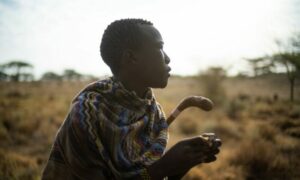
Between the Rains | FIFDH 2024
10 March 2024 | 19:00 CET | Espace Pitoëff – Grande Salle
16 March 2024 | 21:00 CET | Grütli – Salle Simon
Followed by a discussion, “Carte blanche to Rokhaya Diallo – Climate equity: women on the front line” on 10 March

Increasing recognition, participation and protection of environmental defenders through co-creation of a Leaders Network for Environmental Activists and Defenders (LEAD) | Breakfast Meeting
11 March 2024 | 8:30 – 9:45 CET | By invitation only

No Nature-based Solutions Without a Human Rights-based Approach | Geneva Rights and Environment Talks
11 March 2024 | 9:45 – 11:00 CET | Palais des Nations, H307-1 & Online
SR environment and human rights & Geneva Task Force on Human Rights and Biodiversity, Earthjustice & GEN

Protecting Environmental Defenders: Updates and Challenges | Geneva Rights and Environment Talks
11 March 2024 | 13:00 – 14:30 CET | Building H
GeRoadMap 40/11, ISHR, Earthjustice & GEN

The state of women human rights defenders 2023 | HRC55 Side Event
11 March 2024 | 14:30 – 15:30 CET | Palais des Nations, Room XXVII
Sweden, Kvinna till Kvinna, OHCHR & SR on human rights defenders

The right to access to and participate in science | HRC55 Side Event
11 March 2024 | 16:00 – 17:00 CET | Palais des Nations, Room XXV
Greece, India, U.S., URG

Interactive Dialogue with SR on human rights defenders
12 March 2024 | 14:30 – 16:45 CET | Palais des Nations, Room XX & Online
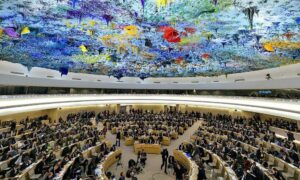
Informal consultations on the draft resolution on the mandate of the Special Rapporteur on the issue of human rights obligations relating to the enjoyment of a safe, clean, healthy and sustainable environment
12 March 2024 | 15:00 – 16:30 CET | Palais des Nations, Room XXII & Online
Costa Rica, Maldives, Morocco, Slovenia & Switzerland
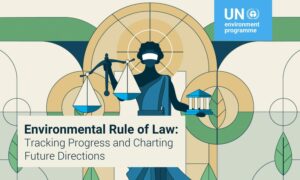
Environmental Rule of Law: Tracking Progress and Charting Future Directions | Global Report Launch
12 March 2024 | 10:00 – 11:30 CET | International Environment House 1, Room 2 & Online, Webex
UNEP & GEN
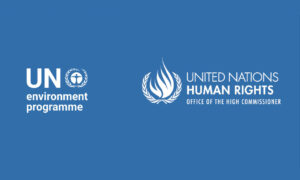
Briefing on the right to a clean, healthy and sustainable environment | HRC55 Side Event
12 March 2024 | 13:00 – 14:00 CET | Palais des Nations, Room XXV & Online
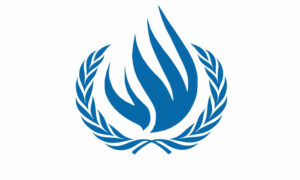
Interactive Dialogue on HC report on climate change
14 March 2024 | 9:30 – 10:00 CET| Palais des Nations, Room XX & Online
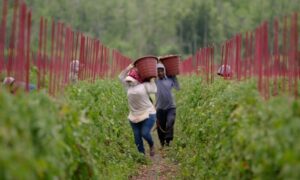
Food, Inc. 2 | FIFDH 2024
13 March 2024 | 18:30 CET | Espace Pitoëff – Grande Salle
Followed by a discussion, “Feeding humanity and preserving the biosphere“

Made in Bangladesh : la face cachée de nos vêtements | FIFDH 2024
13 March 2024 | 18:30 CET | Espace Pitoëff – Grande Salle
Film projection followed by a panel discussion

Stories and Struggles of Women Environmental Defenders | HRC55 Side Event
14 March 2024 | 15:00 – 16:00 CET | Palais des Nations, Room XXV
Rosa Luxemburg Foundation, CETIM, FIAN international, Asia Pacific Network of Environment Defenders (APNED), Philippines UPR Watch (PUPRWatch), Kalikasan People’s Network for the Environment, Peace Brigades International, Earthjustice

The new Working Group on Rights of Peasants and Other People Working in Rural: Challenges and perspectives from the field | HRC55 Side Event
14 March 2024 | 16:00 – 17:00 CET | Palais des Nations, Room XXV
Bolivia, La Via Campesina, CETIM, FIAN International, South Center, Gambia, Luxembourg, South Africa & Geneva Academy

Media and Civil Society Under Pressure ahead of COP29 in Azerbaijan
15 March 2024 | 13:00 – 14:00 CET | Palais des Nations, Room XXV
Human Rights House Foundation

Café des Libertés – Climate activists take on the multinationals
15 March 2024 | 18:30 CET | Espace Pitoëff – Café du Festival
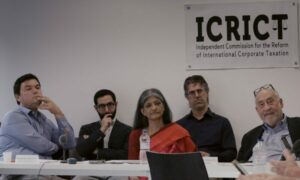
Tax Wars | FIFDH 2024
17 March 2024 | 17:00 CET | Espace Pitoëff – Café du Festival
Followed by a discussion, “Re-enchanting hope facing global challenges“

Draft Proposals | Initial Deadline
21 March 2024 | 13:00 CET

Human Rights in Azerbaijan ahead of UNFCCC COP29
21 March 2024 | 16:00 – 17:00 CET | Palais des Nations, Room XXV
Institute for Human Rights

The Presidency of the Human Rights Council meeting with NGOs | HRC 55 Side Event
25 March 2024 | 13:00 – 14:00 CET | Palais des Nations, Room XXII
Office of the Presidency of the Human Rights Council
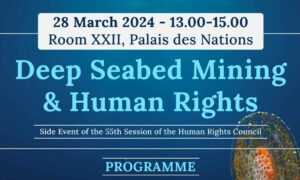
Deep Seabed Mining and Human Rights | HRC55 Side Event
28 March 2024 | 13:00 – 15:00 CET | Palais des Nations, Room XXII
Switzerland with Dona Bertarelli Foundation, IUCN, OHCHR, Costa Rica, Ecuador, Fiji, France, Germany, Marshall Islands, Morocco, Panama & Samoa

Decisions and Conclusions
4 – 5 April 2024 | Palais des Nations, Room XX
Reports
Reports presented at HRC55 relating to the global environmental agenda are listed below. The full list of reports can be consulted on the HRC website.
- A/HRC/55/37 | Measures for minimizing the adverse impact of climate change on the full realization of the right to food | Report of the United Nations High Commissioner for Human Rights
- A/HRC/55/41 | Expert seminar on the responsibility of business enterprises to respect the human right to a clean, healthy and sustainable environment | Report of the Special Rapporteur on environment and human rights
- A/HRC/55/43 | Business, planetary boundaries, and the right to a clean, healthy and sustainable environment | Report of the Special Rapporteur on environment and human rights
- A/HRC/55/43/Add.1 | Visit to Chile | Report of the Special Rapporteur on environment and human rights
- A/HRC/55/43/Add.2 | Visit to Botswana | Report of the Special Rapporteur on environment and human rights
- A/HRC/55/44 | Right to participate in science | Report of the Special Rapporteur on the field of cultural rights (advance copy available in English)
- A/HRC/55/49 | Fisheries and the right to food in the context of climate change | Report of the Special Rapporteur on the right to food
- A/HRC/55/50 | “We are not just the future”: challenges faced by child and youth human rights defenders | Report of the Special Rapporteur on the situation of human rights defenders
- A/HRC/55/50/Add.1 | Visit to Tajikistan | Report of the Special Rapporteur on the situation of human rights defenders
- A/HRC/55/50/Add.2 | Visit to Georgia | Report of the Special Rapporteur on the situation of human rights defenders
- A/HRC/55/53 | Resettlement after evictions and displacement: addressing a human rights crisis | Special Rapporteur on adequate housing as a component of the right to an adequate standard of living, and on the right to non‑discrimination in this context
- A/HRC/55/59 | Report on the ninth session of the open-ended intergovernmental working group on transnational corporations and other business enterprises with respect to human rights
- A/HRC/55/59/Add.1 | Text of the updated draft legally binding instrument with the textual proposals submitted by States during the ninth session of the open-ended intergovernmental working group on transnational corporations and other business enterprises with respect to human rights
Resolutions
Resolutions (found on the HRC55 website) relating to the global environmental agenda tabled at HRC55 and their subsequent decisions are listed below.
A summary of actions on the resolutions is provided by the Geneva Centre for Human Rights Advancement and Global Dialogue.
- A/HRC/55/L.1 | Mandate of the Special Rapporteur on the human right to a clean, healthy and sustainable environment | Costa Rica, Maldives, Morocco, Slovenia & Switzerland | Adopted without a vote
Renews the mandate as the Special Rapporteur on the human right to a clean, healthy and sustainable environment (formerly “Special Rapporteur on the issue of human rights obligations relating to the enjoyment of a safe, clean, healthy and sustainable environment). - A/HRC/55/L.3 | Right to food | Cuba | Adopted without a vote
Recognizes the importance of giving due consideration to the adverse impact of climate change on the full realization of the right to food. - A/HRC/55/L.10 | Right to work | Egypt, Greece, Indonesia, Mexico, Romania | Adopted without a vote
Emphasizes that actions and responses to address climate change in the context of sustainable and inclusive economies and the fast pace of technological advances present unprecedented opportunities for States to build a better, inclusive, accessible and sustainable world of work that can benefit from the untapped potential of persons with disabilities. - A/HRC/55/L.12 | Adequate housing as a component of the right to an adequate standard of living, and the right to non-discrimination in this context | Finland, Brazil, Germany, Namibia | Adopted without a vote
Calls on States to take the right to adequate housing into account in strategies for adaptation to and mitigation of climate change, and to work with affected communities and individuals, including persons with disabilities, to develop and promote environmentally sustainable and sound housing design, construction and maintenance to address the effects of climate change while ensuring the right to adequate housing.
Call for Submissions
Special Procedures
The special procedure mandate-holders are independent human rights experts who help advance human rights, by reporting and advancing from a country-specific or thematic perspective, some of which are related to the environment. Calls for submissions are made to help mandate-holders prepare their reports to the Human Rights Council.
Videos
Videos of related events are featured in this section.
5 March 2024 | Business, Planetary Boundaries, and the Right to a Clean, Healthy and Sustainable Environment
8 March 2024 | Clarifying Norms in Conservation and Human Rights
Links and Resources
- 55th session of the UN Human Rights Council
- GCHRAGD | Updates on HRC55
- ISHR | HRC55 | Key issues on agenda
- URG | Inside Track: HRC55
- GEN | Human Rights and the Environment
News and Updates
- 200+ NGOs urge UN to ensure defenders can continue to participate online | ISHR | 6 February
Over 200 organisations sent a joint letter to UN representatives calling on them to ensure live online modalities of participation for UN human rights bodies and mechanisms in light of concerns regarding access and participation of civil society in these spaces.
Past HRC Sessions
Environment @ HRC54 | Environment @ HRC53 | Environment @ HRC52 | Environment @ HRC51 | Environment @ HRC50 | Environment @ HRC49 | Environment @ HRC48 | Environment @ HRC47 | Environment @ HRC46 | Environment @ HRC45 | Environment @ HRC44 | Environment @ HRC43
Who to Follow on X
@UN_HRC | UN Human Rights Council
@Morocco_UNOG | Permanent Mission of the Kingdom of Morocco to the United Nations Office at Geneva, President of the Human Rights Council in 2024
@F_Ruddyard | H.E. Amb. Febrian Ruddyard, Permanent Representative of Indonesia to the United Nations Office at Geneva, Vice-President of the Human Rights Council in 2024
@DStaniulis1 | H.E. Amb. Darius Staniulis, Permanent Representative of Lithuania to the United Nations Office at Geneva, Vice-President of the Human Rights Council in 2024
@marceloscappini | H.E. Amb. Marcelo Eliseo Scappini Ricciardi, Permanent Representative of Paraguay to the United Nations Office at Geneva, Vice-President of the Human Rights Council in 2024
@SchroderusFox | H.E. Amb. Heidi Schroderus-Fox, Permanent Representative of Finland to the United Nations Office at Geneva, Vice-President of the Human Rights Council in 2024
@UNHumanRights | The Office of the High Commissioner for Human Rights (UN Human Rights)
@volker_turk | UN High Commissioner for Human Rights
@NadaNashif | United Nations Deputy High Commissioner for Human Rights
@SREnvironment | David Boyd, SR on human rights & the environment
@SRtoxics | Marcos Orellana, SR on toxics and human rights
@RelatorDd | José Francisco Calí Tzay, SR indigenous peoples
@SRWatSan | Pedro Arrojo Agudo, SR on rights to water and sanitation
@MichaelFakhri | Michael Fakhri | SR on right to food
@AXanthaki | Alexandra Xanthaki | SR on cultural rights
@ISHRglobal | The International Service for Human Rights
@FranciscansIntl | Franciscans International
@Geneva_Academy | Geneva Academy of International Humanitarian Law and Human Rights
@hrw | Human Rights Watch
@URGthinktank | Universal Rights Group (URG)
@YvesLador | Special Representative of Earthjustice in Geneva
@duycks | Senior Attorney – Climate and Energy Programme at the Center for International Environmental Law
@katha_nina | Katharina Rall, Senior Environment Researcher at Human Rights Watch
@ChildRightsCnct | Child Rights Connect
@CERI_Coalition | Children’s Environmental Rights Initiative (CERI)
@CRINwire | Child Rights International Network



